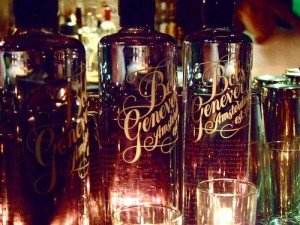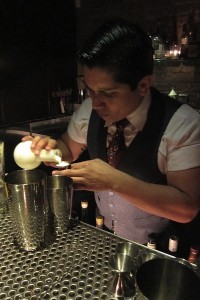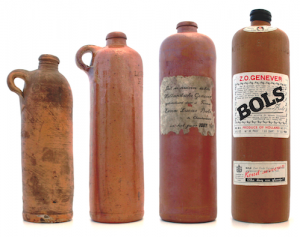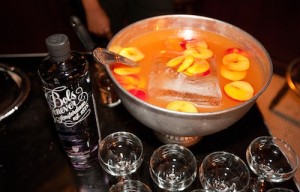There isn’t much that’s new when it comes to gin. Genever, a Dutch spirit made from unaged whisky, malt wine and finished with juniper berry, is even older, predating its cousin by about 100 years. But like other spirits whose sun rose and set long before blood alcohol levels were ever an issue, genever is making a comeback.

Bols Genever bottles hint of the aromatic spirit within. Photo © Nathan Hazard // The Chocolate of Meats
Like alcohol-soaked sponges on a boozy countertop, mixologists who have come of age in this current cocktail renaissance are thirsty to absorb all they can about obscure spirits and cocktail recipes, and genever is high on the list.
When Dutch distiller Lucas Bols released Bols Genever in the US in 2008, it hit the biggest high-end cocktail markets across the country: New York, San Francisco and Los Angeles. It immediately piqued the interest of cocktail aficionados and has been gaining traction ever since. Virtually unknown only three years ago, now that Bols Genever is commercially available, it’s beginning to appear in more menus as bartenders want to demonstrate both a historical, alongside practical, knowledge of their craft.
“At the end of the day,” says Don Lee, former beverage director of PDT and head bartender of Momofuku Ssam Bar in New York, “it gives us another story to tell our customers and it is a unique flavor we get to play with.”
First, to clarify the story: genever is older than gin. It is often called “Dutch gin” or “Hollands gin” but actually predates gin by a century.
Essentially, “the Dutch taught the English to distill juniper,” says Los Angeles-based cocktail expert Marcos Tello of Tello Demarest Liquid Assets and Brand Ambassador for Bols Genever. “But English gin has gone so far from the original” that the two spirits should be considered in two separate categories.

Renowned mixologist Marcos Tello experiments with Genever extensively as brand ambassador for Bols Genever. Photo © Guzzle & Nosh
Initially brewed up in the the late 16th century by a Dutch alchemist and sold as an elixir, genever became a popular drink amongst the Dutch and Flemish by the 17th century. It’s more accurate to describe genever as an unaged whisky: made of a malt wine of rye, wheat and corn distillate then blended with juniper berry and other botanicals. This combination of ingredients gives it a smoky, malty taste with distinct spice, herb, citrus and floral flavors and aromas.
The Thirty Years’ War first introduced English soldiers to the malty spirit; troops fortified themselves for battle with it, coining the expression “Dutch courage.” The rest of the English population began to consume it after William III of England (who was also Dutch) began to import it into the country.
It wasn’t until the early 18th century that the English started to distill a cheaper version they called “gin.” Gin, however, was distilled with alcohol instead of malt wine, then mixed with junipers. Another missing component during this crude stage of gin-making was the strong botanicals found in genever, since England lacked Holland’s easy access to botanicals.
Before Americans Discovered Beer…
At one point, Americans were also great consumers of genever. Prior to the Temperance movement and Prohibition, genever was imported into the US at a rate of 5 to 1 to gin. Legendary 19th century barmen Harry Johnson and Jerry Thomas both used genever in their classic recipes. In Thomas’ 1862 book “Bartender’s Guide,” genever was one of four main spirits used in cocktails — alongside brandy, rum and whisky. After Prohibition, however, gin dominated the market and genever disappeared from American shelves.
At one point, Americans were also great consumers of genever. Prior to the Temperance movement and Prohibition, genever was imported into the US at a rate of 5 to 1 over gin.
Now that it’s back on the US market, there is a general sense of interest in genever as bartenders thrive on reviving cocktail classics. After all, Jerry Thomas and Harry Johnson would have made drinks like the mint julep or Collins using genever instead of bourbon. At Cole’s in Los Angeles, one can find the Original Martinez cocktail, which replaces Old Tom Gin with genever, giving it a slightly sweeter edge. Tello finds that genever is adaptable in many existing recipes while “people are discovering how versatile it is” to create new ones. Gin cocktails can be made with genever though both Lee and Tello find that genever’s malt flavor can be a better substitute for unaged whisky cocktails instead.
And while bartenders have become more educated about genever as a cocktail base, Lee also points out that its “unmatched authenticity in lineage and flavor makes Bols Genever an easy product for bartenders to get behind.”
One authentic touch can be found at the Comstock Saloon in San Francisco. The Happy Hour includes the Dutch national tradition of a “kopstootje” (which means “little headbutt”) that involves drinking a shot of genever chased with a beer. To be even more Dutch, one bends at the waist, with arms behind the back, to take the shot without spilling a drop.
But while shots may not offer much in the way of creativity, this kind of marketing in a high profile bar doesn’t go unnoticed by an increasingly sophisticated drinking public constantly looking for new drinking experiences.
A One-Two Punch
Last summer, Tello helped organize a walking punch crawl in downtown Los Angeles with genever as its star. Cocktail bars The Falls Lounge, Varnish, Cole’s, Drago Centro and Bar & Kitchen ladled custom punches called the Dutch Pugilist Punch, the Flowing Bols, Vondlepark Punch and the Panamanian Detective — a concoction of Bols Genever, guava, lime juice and Averna — for an enthusiastic crowd of revelers. Backed by its storied past intertwined with legends of English sailors with a love for drink, the Dutch spirit has played a role in the resurgence of punch bowls found in fancy drinking dens lately.
With its reemergence in the US, the legacy of genever can go on and continue to inspire tasty and versatile experimentation of drinks served from a silver punch bowl to a Collins glass.
“Bartenders are stepping up their game and using old time ingredients with new ingredients to draw up new drinks,” says Tello. “It’s a very exciting time.”


Hi,
Genever originated in Belgium, not Holland.
Do you want to know more about the history of genever ? Check out this book, http://www.amazon.com/Genever-500-Years-History-Bottle/dp/0615795854
Thanks,
Steven